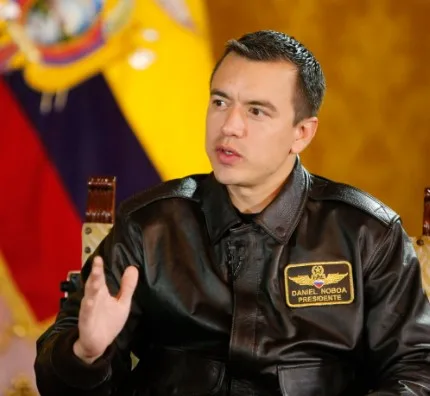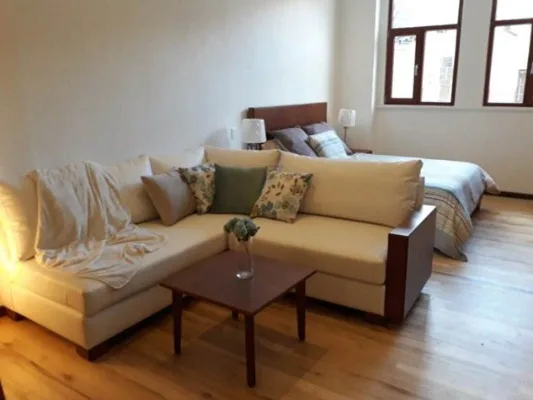Considering Noboa after 100 days: The war on crime gets high marks but what about other problems?
By Liam Higgins
As President Daniel Noboa completed the first 100 days of his presidency last week he enjoys record high levels of public support for militarizing the fight criminal gangs and cartels. Many experts say, however, that he may be ignoring problems underlying the criminality.

President Daniel Noboa
“As the old saying goes, you can’t argue with success, but there is the question of how long this success will be sustained,” says University of San Francisco-Quito public policy professor Fabricio Abad. “After the events of early January, the government had no choice but to go after the criminals. The public demanded it,” he says. “On the other hand, why are we hearing so little about the conditions that lead to crime?”
Abad suggests a tour of the slums of Guayaquil, Esmeraldas and Manta to understand the growth of criminal gangs. “You enter these neighborhoods at your own risk, of course, but what you see are terrible conditions, neglected infrastructure and the absence of basic services — and a lack jobs for young people. The government has ignored these conditions for years and it is paying the price for that neglect.”
Abad suggests an approach to the problem similar to the one against gangs and cartels. “There should be programs that keep teenagers in school and that provide educational opportunities beyond high school,” he says. “There should be programs that hire unemployed youth for public service work, that teaches them skills and, at the same time, cleans up neighborhoods and public facilities.”
Abad even suggests putting a price tag on remedies for the youth crisis. “Noboa just said he needs an additional $750 million to support the police and military. How about asking the same amount for programs that focus on young people and poverty in high crime areas?” he asks.
To fund programs that Abad suggests takes money and María Paz Jervis, president of the Ecuador Chamber of Industries and former business professor, says this requires a top-to-bottom overhaul of Ecuador’s tax system.
“Once again, we just saw another half-hearted, piecemeal approach to solving the country’s financial crisis,” she says. “To fund the fight against the narcos, the National Assembly approved a program of temporary increases, and the president added a timid one percent increase of the VAT with a short-term increase of two more points. As before, we see a reluctance to address structural changes to the tax code by either the president or the Assembly. Isolated measures such as a small increase of the VAT is not the solution. The real solution takes courage and that seems to be in short supply on all sides these days.”
Jervis blames “selfish” political interests for the refusal to face tough choices. “What is needed is an honest debate with proposals from the left, right and political center, but also one that acknowledges the need for radical change. As it is, the president and legislators are more concerned with the optics of the next election.”
Among the changes Jervis says are required are a restructuring of the income tax system, drastic cuts to fuel subsidies as well and addressing informal labor. “The subsidies are killing us and no one is willing to make the big changes. The same is true with informal labor. We know that 25% to 30% of informality should be taxed but there’s no interest in going after the cheaters.”
Jervis says Noboa should lead the charge to real tax change. “Under the law, this is his job and so far he is not taking the lead.”
Along with crime and the budget crisis, former assistant Interior Minister Raúl Martínez considers conditions in Ecuador’s prison system a top national concern. “Because so many of the gang leaders are incarcerated, the prisons are where crimes are planned and murders are ordered, including the one of Fernando Villavicencio.”
“Everyone is breathing a sigh of relief now that the prisons are under armed forces control,” he adds. “The riots have stopped, weapons have been removed, luxury accommodations and internet networks been taken down. But putting soldiers in charge of prisons is a short-term solution. What happens when they leave?”
Fixing the prisons and taking control back from the prisoners, Martínez says, will require a substantial investment. “We need a new management plan along lines of those in Europe and the U.S. We need changes to the physical structure of some prisons to protect guards and allow inmates to be controlled in case of trouble. We need surveillance, both electronic and in person, of prison personnel to identify the corruption and bribery that allows weapons, drugs and other prohibited items from entering.”
Martínez agrees with Noboa’s plan for two new maximum-security prisons. “Yes, these are necessary to separate gang leaders and other dangerous inmates,” he said. “But it is only one of several measures needed to regain control of the system. What I am not hearing from the president or National Assembly is how we’re going to pay for the changes and this must be part of the discussion.”
So what can the public expect in the 11 months remaining of Noboa’s cross death-shortened presidency?
“The big problem, as it usually is, is politics,” says Jean Paul Pinto, university lecturer and security consultant. “We are already into the election cycle and this is typically the time when hard decisions are deferred. Because of the cross death, there will not be enough time to evaluate the success of Noboa’s approach to criminality or budget issues.”
Barring unforeseen circumstances, Pinto believes Noboa is headed for reelection. “People are giving him the benefit of the doubt based on his war on criminal gangs, particularly his use of the military, and it is fair to say there has been some early success. The question is whether that success continues and how he deals with other important issues.”





















